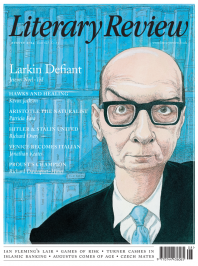Philip Womack
Lynch Mob
The Making of Mr Bolsover
By Cornelius Medvei
Harvill Secker 196pp £12.99
This curious novel, Cornelius Medvei’s third, purports to be a political biography detailing the life of Mr Bolsover, a man who has ‘passed into folklore’, who either died in a ‘hail of bullets’ or ‘fled to Panama’. We are led to believe, by the dry voice of the ‘biographer’, that he was a man of consequence. Nothing, however, is straightforward; as the biographer (ungendered, unnamed, although there is the slightest of hints that it might be a woman) warns, the most forthcoming witnesses are also the ‘least credible’. The book is an exploration of how myths are engendered as much as it is a whimsical satire of political ambition, and it is also very much in love with the Sussex countryside that it so beautifully evokes.
The Making of Mr Bolsover has much in common with Magnus Mills’s well-
controlled yet fantastical fables: assured, precise prose; less attention paid to characters than to the game of obfuscation; and a sense of distinct unease and bureaucratic menace. The narrative is at two removes. Not only is there the

Sign Up to our newsletter
Receive free articles, highlights from the archive, news, details of prizes, and much more.@Lit_Review
Follow Literary Review on Twitter
Twitter Feed
Though Jean-Michel Basquiat was a sensation in his lifetime, it was thirty years after his death that one of his pieces fetched a record price of $110.5 million.
Stephen Smith explores the artist's starry afterlife.
Stephen Smith - Paint Fast, Die Young
Stephen Smith: Paint Fast, Die Young - Jean-Michel Basquiat: The Making of an Icon by Doug Woodham
literaryreview.co.uk
15th-century news transmission was a slow business, reliant on horses and ships. As the centuries passed, though, mass newspapers and faster transport sped things up.
John Adamson examines how this evolution changed Europe.
John Adamson - Hold the Front Page
John Adamson: Hold the Front Page - The Great Exchange: Making the News in Early Modern Europe by Joad Raymond Wren
literaryreview.co.uk
"Every page of "Killing the Dead" bursts with fresh insights and deliciously gory details. And, like all the best vampires, it’ll come back to haunt you long after you think you’re done."
✍️My review of John Blair's new book for @Lit_Review
Alexander Lee - Dead Men Walking
Alexander Lee: Dead Men Walking - Killing the Dead: Vampire Epidemics from Mesopotamia to the New World by John Blair
literaryreview.co.uk